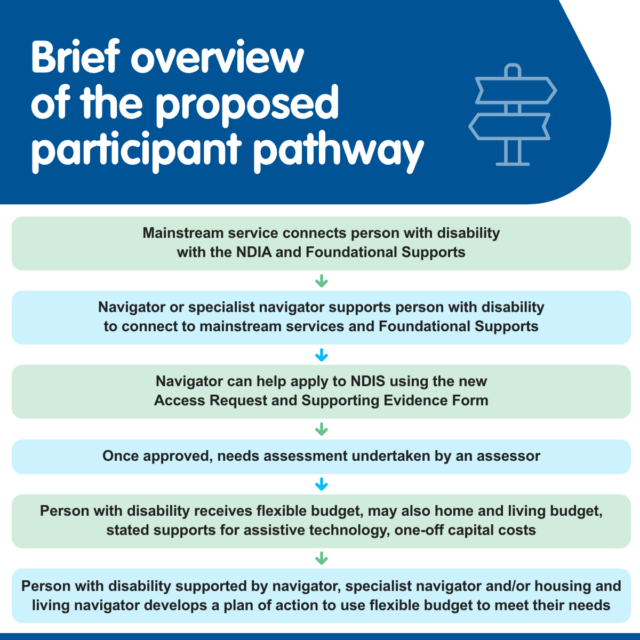The National Disability Insurance Scheme (NDIS) Review Final Report proposes a major shake-up of the participant pathway and experience. Accessing the NDIS, plan budgeting and implementation, and the roles the NDIS workforce will play are set to change.
How does it currently work?
Only people who meet certain requirements can access the NDIS. Currently, you have to be a person with disability aged between 9 and 65 and meet the disability requirements, which states your disability must be caused by an impairment that is likely to be permanent, and substantially reduces your ability to undertake many activities associated with daily living. In other words, eligibility is based on your disability affecting how you live your life, and that it impacts your life all the time.
Once a participant has been granted access, the current process is to set a planning meeting with NDIS staff, after which a NDIS plan is issued. There are currently options for the participant to either manage the budget themselves, or with assistance.
What has been proposed?
The NDIS Review heard the current NDIS access, plan setting and plan implementation processes have been inefficient and often distressing for participants, concerns also shared by PWDA members.
The NDIS Review proposed changes to the participant pathway under Recommendation 3 (a fairer and more consistent participant pathway). Actions under Recommendation 3 set out the approach that needs to be taken to reform the participant pathway, including legislative reform needed to support the changes.
The NDIS Review states:
These reforms would make the planning process clearer, more consistent and less adversarial, and funding outcomes fairer and more consistent.
(p.87)

Proposed new eligibility and access processes
The NDIS Review proposes a new process for determining NDIS eligibility, based on an assessment of functional capacity (Action 3.1). This change would involve removing the existing access lists and introducing an assessment examining how someone's disability affects their daily life to determine access.
Details about the assessment itself has not been provided by the NDIS Review, raising some concerns after the experience the disability community had with independent assessments. However, the Final Report expresses an expectation that assessments will be developed with expert advice and testing.
The NDIS Review has proposed the assessment should cover a broad range of areas including cognitive, language, socio-emotional, motor, and adaptive behaviour, while considering how a condition/s impact on functioning can change over time.
The NDIS Review also recommended the assessment should be funded by the Government and be undertaken by a person with disability's treating professional/s, with the NDIA funding any additional evidence that may be required. The NDIS Review has also proposed a new Access Request and Supporting Evidence Form (Action 3.2).
Proposed new budget setting and budget implementation processes
Once a participant gains access to the NDIS, the NDIS Review proposed two separate meetings take place: one to set the budget and another one to explore how to use the budget.
The new proposed approach to setting the budget will be different to the current line-by-line approach and would be based on a participant's support needs and how complex those support needs are.
A proposed new needs assessment process would be used to determine those needs (Action 3.4). This assessment process still needs to be developed, with existing needs assessments tested with people with different kinds of disability, to determine the best assessment for different types of conditions.
The NDIS Review proposes the budget would then be built for the participant including any individual supports and will include categories for a housing and living budget, plus any stated supports for assistive technology, equipment, or other one-off capital costs.
Once the budget is set, it is envisioned a participant will be able to flexibly use their budget for evidence-based supports and services, through what the review called a 'trust-based approach to oversight of how participants spend their budget' (Action 3.5 and 3.6).
For children in the NDIS early intervention pathway, changes to how supports and services are allocated will be offered on the basis that they are safe, cost-effective, and significantly improve outcomes (Action 3.7).
Proposed new intermediaries and NDIS workforce updates
These changes are accompanied by proposed changes in the roles assisting people in their NDIS journey, as well as ensuring the upskilling and training of staff to meet the proposed overhaul of NDIS processes. These include new role such as a:
- Navigator - who will be agents for the person with disability, acting on their behalf and at their direction (see our Foundational Supports blog)
- Needs Assessor - who will be a representative of the NDIA, conducting the needs assessment to determine the needs of a participant and to set the budget.
These new roles will be supported by actions under Recommendation 15, to attract, retain and train a workforce that is responsive to participant needs and delivers quality support.
Trust needs to be rebuilt
PWDA supports proposals that address known issues in the current participant pathway and experience, and we welcome intentions behind the recommendations to improve NDIS access, budget setting and budget implementation. But after independent assessments, it is essential to rebuild trust between people with disability and the NDIA.
While the NDIS Review purposefully did not outline processes, especially the proposed assessment processes, we need to ensure all changes are done in consultation with people with disability and their representative organisations.
Finally, having access to a budget with funds attached does not necessarily ensure access to quality, consistent supports and services. It is essential that the changes outlined in this blog are accompanied by ensuring a nationally consistent, equitable, and universally available supports (see our Foundational Supports






